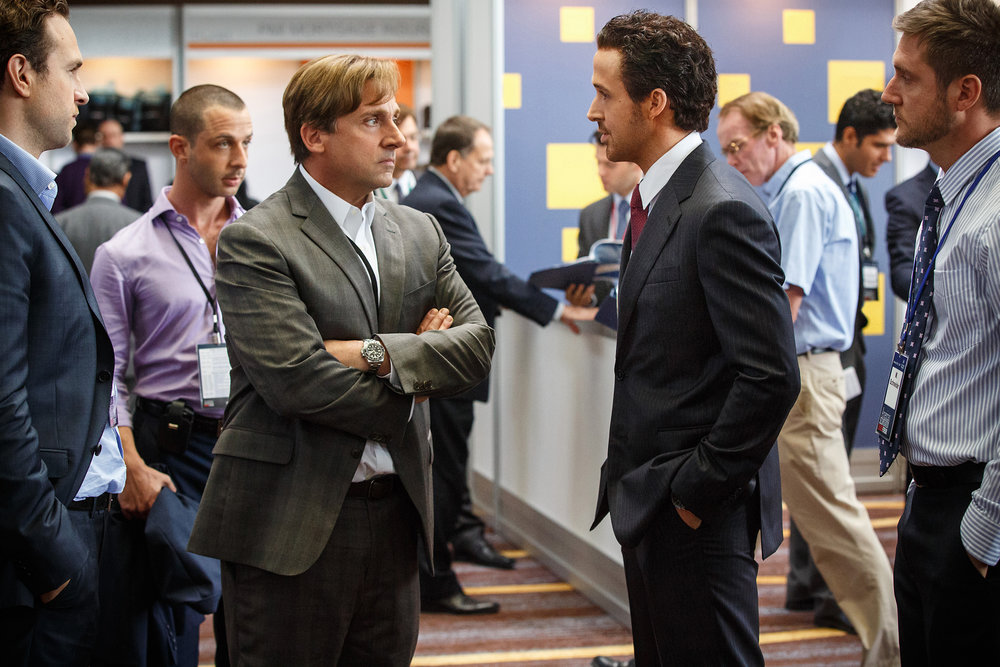
Market Forces Be With You
If I were a conspiracy-minded individual, I might accuse The Powers That Be of trying to bury the year’s most important film. Adam McKay’s pitch-black, true-story dramedy The Big Short is an educational and entertaining look at the 2008 financial crash that might plant the seeds of revolution--if there were any danger of anyone actually seeing it. I would love for this thing to receive mainstream recognition, beyond its well-deserved awards-season considerations, but I'm not hopeful:
A) no one wants to be reminded of how thoroughly they’re being screwed.*
B) Disney has placed a global moratorium on non-Star Wars movie chatter until at least mid-January.
Based on Michael Lewis’ book of the same name, and co-adapted by McKay and screenwriter Charles Randolph, The Big Short follows three key figures in the collapse: doctor-turned-financial-tinkerer Michael Burry (Bale), tightly wound hedge fund manager Mark Baum (Steve Carell), and bank trader Jared Vennett (Gosling). Burry uses his firm’s capital to create the subprime mortgage market, a complex scheme for bidding against traditionally rock-solid mortgage-backed securities. He sees the big-picture problems of banks lending money to buyers with poor credit, no credit, etc., before anyone else does, and quietly builds a fool-proof, multi-billion-dollar investment based on an avalanche of pending defaults. Baum and Vennett catch wind of Burry’s scheme by mistake and attach themselves to the new market—which quickly balloons to catastrophic proportions as all manner of investors begin betting against the mortgage-backed securities, betting against those who bet against them, and betting against those who bet against those who bet against them.
If you wouldn’t know a credit default swap from a swap meet, McKay and Randolph provide helpful pop-up definitions and parade a string of celebrity guests onto the screen. Anthony Bourdain cooks up a lovely day-old-fish metaphor to describe the selling of bad mortgages as AAA-rated products, and pop star Selena Gomez breaks down the system’s insane gambling logistics from a casino floor. Coupled with the idiosyncratic and over-the-top performances of the main cast, The Big Short keeps the audience informed as it keeps the action moving. McKay and company are rightfully outraged, and they transfer their incredulity to the audience by forcing them to finally pay attention to details they hadn't even known to consider.
At times, Carell climbs a tad too far out on the limb with his portrayal of Baum’s indignation. His exasperated, “Can you explain that again, just so I understand how messed up this situation is?” faux-naivete smacks of Daily Show hand-holding. Where Gosling’s Gordon Gecko acolyte and Bale’s Asperger’s afflicted numbers whiz paint uniquely compelling cartoon monsters, Carell has his feet planted thanklessly in two disparate worlds: he’s at once an audience surrogate and one of the film’s chief villains.
Mark Baum never quite believes he’ll make as much money as he does off the unwitting misery of others. He’s convinced that the banks and government watchdogs will step in once they realize the economy is headed over a cliff. But neither he nor his accomplices warn the suckers at the middle and bottom of the pyramid to seek shelter—because the size of his slice of the pie depends on complicity. If painted in narrower strokes, the maniacal side of Baum’s conflicted personality might have been as convincing as his melancholy.
In my heart, Adam McKay has delivered the vital middle chapter in a Market Manipulation Trilogy that began with Scorsese's The Wolf of Wall Street, and concludes with Bahrani's 99 Homes. Wolf was all about the larger-than-life personalities of schemers looking to exploit every available facet of The American Dream. The Big Short is about the mechanics of those schemes, nearly two decades removed. 99 Homes is the fallout chapter, the grim tale of consequences for the people that folks like Burry, Baum, and Vennett bundled into theoretical products and spent like Monopoly money. Like Spotlight, another fine piece of nitty-gritty cinema, we get very little insight as to the personal lives of those working the system. We know these people are damaged, likely past the point of redemption, but there are no corny confrontations with family, and few speeches about the immorality of what they’re building (or, more to the point, destroying). One character ascends a centimeter-high soapbox, only to acknowledge that he’s not going to stand against the atrocity in which he’s complicit.
The Big Short is a pitchforks-and-torches movie, a rousing piece of tragicomic poetry that scorns its villains and scolds its audience into alertness. Earlier this year, a story broke about Samsung’s Smart TVs. The devices use microphones to pick up voice commands, which are converted to text, and then sent to a third party. The user agreement accompanying each unit outlines this, and the fine print has some very interesting language about the devices’ ability to record full conversations—even when the voice-command feature is disabled. How many customers would have thought twice about buying those TVs, had that note been writ large across the display models? I imagine 2006-era homebuyers pressing "Pause" in similar numbers, had someone delicately explained the impact of adjustable-rate mortgages to them.
*Even if it’s a smoldering-hunk super-team of Ryan Gosling, Christian Bale, and Brad Pitt doing the screwing.

